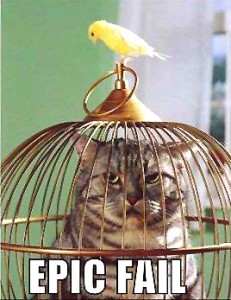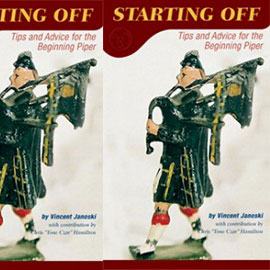EUSPBA Grade 4 Piobaireachd = Tuning Up for FAIL
 The eastern piping competition season is well underway and bagpipers across the seaboard are busy practicing and working hard to make good music. it’s easy in the hubbub, though, to lose sight of the nitty gritty that has a tremendous influence over our activities. One such pile of grit was the kerfuffle over the recent rule change for Grade 4 solo pipers playing piobaireachd that
The eastern piping competition season is well underway and bagpipers across the seaboard are busy practicing and working hard to make good music. it’s easy in the hubbub, though, to lose sight of the nitty gritty that has a tremendous influence over our activities. One such pile of grit was the kerfuffle over the recent rule change for Grade 4 solo pipers playing piobaireachd that abolished sidelined the “ground only” requirement in favor of the full tune. Despite heated opposition, the rule change was left in effect for the 2011 season and beyond. People have strong feelings on both sides of this issue and many points were discussed in the March 31 Bagpipe Nation podcast.
The argument goes something like this: We want to encourage good piping in the east so we must force pipers to play full piobaireachd as early as possible so they are ready for the higher grades. They will thus achieve greater competency sooner when they move up to Grade 3 and above.
The counter argument goes something like this: Forcing beginning pipers to play full piobaireachd does a disservice to their development by discouraging them from trying the form to begin with, whereas providing an introductory event such as “ground only” allows them to get the feel for performing the music before hitting it in earnest in higher grades.
The facts, however, are thus: No clear evidence exists that players moving up through the higher grades suffer in their piobaireachd playing at all with the existence of a “ground only” event in Grade 4. Fewer players historically attempt the Grade 4 piobaireachd ground event than those who play the 2/4 March in every competition in the eastern circuit. The total number of competitors entered in each grade of solo bagpipe competition has remained more or less stable games-to-games over the years.
It stands to reason that if the argument either for and against the rule change were true, we could measure the effects given enough time and information. Here we are, six months or so into the 2011 competition season and a new fact is emerging as plain as the rising sun: The number of Grade 4 beginning pipers playing piobaireachd in competition is shrinking dramatically.
 Competition data gathered at seven games over the last six months of major competitions reveals that only 48% of Grade 4 competitors who played in a 2/4 march competition also played in the piobaireachd. That is a 32% drop from 2010 where an average 80% of Grade 4 competitors tried the ground only event in the same games events in the same period. In Grade 4 Jr. event, one in which boys and girls under 18 are getting their fingers dirty in competition, and the group that is regarded as the future of our art here in the USA, only 47% tried the full piobaireachd on average compared to 70% who tried the ground in 2010. (Further notes on the chart and the data can be downloaded here.)
Competition data gathered at seven games over the last six months of major competitions reveals that only 48% of Grade 4 competitors who played in a 2/4 march competition also played in the piobaireachd. That is a 32% drop from 2010 where an average 80% of Grade 4 competitors tried the ground only event in the same games events in the same period. In Grade 4 Jr. event, one in which boys and girls under 18 are getting their fingers dirty in competition, and the group that is regarded as the future of our art here in the USA, only 47% tried the full piobaireachd on average compared to 70% who tried the ground in 2010. (Further notes on the chart and the data can be downloaded here.)
Most games this early in the season are centered in the southern areas of the eastern region. A similar analysis would be welcome once the major games of the northeast regions take place later this year. For the more statistically rigorous among us, yes, more data is needed to have any confidence in these findings. But the end of the season is still five months away and the trend taking shape now is one that is unlikely to reverse in that time.
The thrust of the EUSPBA “system,” if you will, is centered on the idea of promoting “more”—more games, more competition, more membership, more pipe bands, more people playing bagpipes and drums. The emergent trend, however, is the opposite of that. You may continue to cling to the notion that players are better because they are required to play a full piobaireachd in the early competition grades, but your presumption is impossible to test since so few are playing. In a consistently shrinking field, where few folks are willing to fully explore the music of the bagpipe, what have we really achieved?
The effect this has on our little subculture of piping can only be negative. What happens when it is culturally acceptable to ignore piobaireachd as a musical form? What we have is a glimpse of a trend that flies in the face of the desired effect argued in the support for this rule change. I can only imagine the discussions at this year’s and future year’s grading committee meeting, when it comes time to decide if players should be moved up a grade, and it is revealed that a large number of good capable players haven’t played a note of piobaireachd in competition. What kind of effect will it have on the eastern standard of play compared to the rest of the piping world with fewer players ever attempting to perform piobaireachd at all?
The bottom line is this: Without any kind of real measures, it is impossible to determine the efficacy of any change to our competitive activities—particularly changes that allegedly push EUSPBA goals. Only hard evidence, even observed empirical evidence, will support arguments either way for changes to our musical efforts. A simple analysis of this one change, however, reveals an “epic fail” that should concern any discriminating piper who cares about our little eastern US bagpiping scene.
-
Tim Carpenter
-
Vince
-
 Pipehacker
Pipehacker








